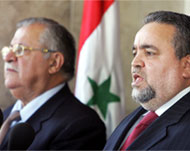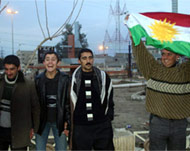Emotions run strong over Iraqi charter
Iraqi Shia and Turkmen factions have voiced reservations over the Iraqi constitution draft, saying it does not serve the interests of all Iraqis.

The opposition to the constitution in Iraq is mainly Sunni Arab, yet there are some non-Sunni factions who say they are in deep disagreement with what the constitution is about.
The office of the revered Iraqi Shia authority, Imam al-Khalisi, has issued a statement in which it repudiated Iraq‘s political process and said the country “is under the full control of the occupation”.
The statement said the proposed constitution consolidates sectarian tension, wastes Iraq‘s riches, and lacks the potential to suite a “great country like Iraq“.
Speaking to Aljazeera.net, Shaikh Hadi al-Khalisi said the constitution represents the interests of “foreign occupation”, not the people of Iraq.
He slammed the draft for considering Islam a “basic source of legislation” and not the main source.
“Obviously this constitution is prepared by the occupiers, and the government which was brought by the occupier will not be able to refuse it” he said.
 |
|
Al-Hassani (R) is optimistic |
“It has been presented that Sunni Arabs are opposing the constitution. We see in that a character assassination of Iraqi nationalists who reject the constitution and they belong to all religions and sects”.
Al-Khalisi said the issue is about something the government wants and people who oppose the government.
“The government is in favour of the constitution, and obviously people who support and dominate the government want the same, but those who do not agree with the government will oppose its projects”.
Turkmen
Turkmen, who constitute Iraq’s third largest ethnic group, are not comfortable with geographical or ethnic federalism, and say such a system will jeopardise their existence as well as put the whole country in danger.
“Geographical or ethnic federation would leave the third ethnic group in Iraq as a minority in a Kurdish federation. Even though we are a majority in several parts of Iraq such as Talafar and Kirkuk,” said Nabil Herbo, the media representative of Turkmen Front in Talafar.
He told Aljazeera.net that the constitution does stipulate that Turkmen are the country’s third ethnic group but does not specify their rights and obligations.
“The constitution left the Turkmen language untouched. We want to teach our language in our areas, but the constitution does not give us that right” he said.
However, Herbo said negotiations are still going on, and his Front will go eventually with what the Turkmen bloc in the parliament decides.
Resources
Asif Soturkman, the representative of Turkmen Front in Britain, criticised the attempts to seize the wealth of Iraq in the draft constitution.
|
“It has been presented that Sunni Arabs are opposing the constitution. We see in that a character assassination of Iraqi nationalists who reject the constitution and they belong to all religions and sects” Hadi al-Khalisi, |
“They say the resources of each region in Iraq go to the ethnicity that rules that region. What does that mean? If an Iraqi Arab or Turkmen lives in a region without resources, he or she would starve to death?” Soturkman said.
“It is well known that revenues of a country go to the people of that country. Iraq’s resources are for all Iraqis”.
He said federalism is about gathering several small entities in one big powerful country as is the case in Canada for example. But what is happening in Iraq is the contrary: they want to break an already powerful country.
Demography
Soturkman accused the Kurds of bringing hundreds of thousands of Iranian Kurds into Kirkuk claiming they were displaced by Saddam Hussein’s government.
“The Turkmen used to be a majority in Kirkuk. We lived in city and know what had happened in it. All that the Saddam regime had displaced were around 11,000 Kurds and Turkmen, but now Kurds have become a majority in Kirkuk.”
Soturkman said: “The Kurds want Arabs out of Kirkuk by 2007. Will they do the same with Kurds who have been living in the restl of Iraq? Will they tell the million Kurds in Baghdad to go back to the north? Why they do not want others to live with them?”
Al-Sadr trend
Shia leader Muqtada al-Sadr shares with Sunni and other factions reservations about federalism and other parts of the constitution draft.
 |
|
Kurds are accused of flooding |
He may well join forces with the Sunnis in the referendum. Al-Sadr’s followers have joined recent Sunni protests against the constitution.
Al-Sadr’s potential role was thrown into sharp focus on Wednesday when clashes broke out between his followers and those of the biggest Shia party after a brawl in front of his office in Najaf left four dead and the building in flames.
A government delegation went to Najaf on Thursday to investigate the incident, and met with Al-Sadr in his Najaf headquarters.
Optimism
The speaker of Iraq’s parliament announced a one-day extension early on Friday in talks on Iraq’s new constitution – a fourth attempt to win Sunni Arab approval. But he said that if no agreement is reached, the document would bypass parliament completely and be decided through the 15 October referendum.
“We legally received the draft. We are optimistic, although there are some differences. But if we are not able to reach agreement in the end, this constitution is going to be presented to the Iraqis in the 15 October referendum.
“Legally speaking, we do not need the parliament to vote on the draft, but we need only a consensus so that all the Iraqis will say yes to the constitution,” he said.
“I still believe that the door is wide enough for reaching an agreement.”
Last Monday was the second deadline which the legislature granted after the drafting committee failed to meet the 15 August date set in the interim constitution.